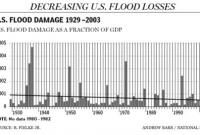It takes real dedication to “prove” that a 500-year flood event is nothing out of the ordinary, but Roger Pielke , Terence Corcoran and the National Post are nothing if not committed.
Using a statistical trick that would be dismissed in any debating club, Post Business Editor Corcoran argues that the recent round of U.S. flooding can in no way be linked to climate change. In fact, according to his graph, you might be left with the impression that flood damage is actually receding in these weather-battered times.
Well, not true. The graph shows flood damage receding as a percentage of gross domestic product. Only if you imagine that the U.S. economy has not grown in the last 80 years could THAT be a reassuring notion.
It is somewhat to his credit that, if you read Corcoran’s column closely, you see something approaching balance – at least on the part of those who are arguing for a prudent response to an anticipated increase in dangerous weather. Corcoran quotes Henry F. Diaz, of the U. S. Earth Systems Research Laboratory in Boulder, Colorado, saying, flatly, “As everyone notes, any particular occurrence of a climate anomaly cannot be shown in any deterministic fashion to have occurred as a result of global warming.” Which Corcoran translates correctly to mean: “No event like a flood can be pinned on climate change.”
But Diaz goes on to say that as a thoughtful race, humans are compelled to consider this flood in context. There were predictions, and there are trends. There has been an increase in CO2 in the atmosphere that – without question – traps more heat close to the planet – and the troubling implications of that fact appear to be playing out in a way that is costing money and lives. Diaz, Canadian scientist Andrew Weaver, the Intergovernmental Panel on Climate Change and every major science academy in the world all agree that these facts bring us to an unalterable conclusion: climate change is upon us and we must act with all due haste to mitigate the damage.
Corcoran comes to a different conclusion, arguing that we should ignore climate change in favor of BETTER PREPARING FOR FLOODS. Ah, it would seem, from all thoughtful accounts, that preparing for floods is a prudent part of adjusting to a changed climate.
So, in the U.S. midwest, why not start there. Why not admit, as Andrew Weaver says, that this is only the beginning? Start shoring up those dikes and improving those floodways. And while you’re at it, you might think about ways to stop making the problem worse. Say, by reading something more even-handed and forthright than the National Post.
Subscribe to our newsletter
Stay up to date with DeSmog news and alerts







